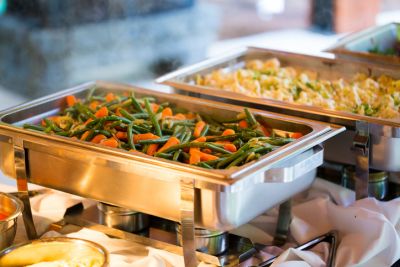 When compiling the guest list for your wedding, your goal is to invite family and friends to join in celebrating your special day. As with many social events, food becomes an important centerpiece around which people gather for fun and fellowship. To ensure that everyone can partake of your carefully selected delicacies, it’s important to find out about any food allergies, religious restrictions or lifestyles they may observe. A guide to typical dietary requirements should help you, your caterers and bakers come up with a delicious menu that all your guests can enjoy.
When compiling the guest list for your wedding, your goal is to invite family and friends to join in celebrating your special day. As with many social events, food becomes an important centerpiece around which people gather for fun and fellowship. To ensure that everyone can partake of your carefully selected delicacies, it’s important to find out about any food allergies, religious restrictions or lifestyles they may observe. A guide to typical dietary requirements should help you, your caterers and bakers come up with a delicious menu that all your guests can enjoy.
Food Allergies Can Make Eating a Nightmare
There’s a good chance that a few of your guests have some sort of food allergy. As the American College of Allergy, Asthma & Immunology explains, their bodies experience an auto-immune response triggered by specific ingredients present in certain types of foods. Most of these fall into the protein category, which accounts for reactions to eggs, tree nuts, shellfish, dairy products, peanuts, fish, soy and gluten. Allergic responses can vary widely but may include intestinal discomfort, hives, coughing, swollen throats, dizziness, skin discoloration and even life-threatening anaphylactic shock.
Kosher and Halal Regulations
Some dietary restrictions, such as kosher and halal, are rooted in theological specifications. If some of your guests are Jewish or Muslim, you’ll likely have a need to accommodate their exact cuisine limitations. While adherents to both religions usually eschew the consumption of pork products, kosher and halal guidelines are slightly different from each other. For instance, kosher regulations forbid eating meat and dairy together while this is permissible by halal standards. Conversely, imbibing alcohol is forbidden under halal but not by kosher laws. Both sets of dietary laws also govern how animals are to be slaughtered, with the Jewish directions more detailed and restrictive than Islamic rules.
Vegan and Vegetarian Eating
Although vegetarianism and vegan eating can be sometimes confused by people unfamiliar with them, there is a distinction between the two. Vegetarians do not usually eat meat, poultry or seafood but may consume dairy and other goods originating from or processed with animal products. On the other hand, vegans eat no animal products at all and may also exclude honey, sugar and gelatin from their regimens. Vegetarian and vegan cuisines may be adopted for moral reasons or for health benefits such as lower total dietary fat, higher fiber content and reduction of blood glucose levels.
Your Caterers Can Help You
The first step to making sure that your guests have access to foods they can eat is to ask about dietary limitations early in your planning. Usually, most couples elect to request this information with the invitations. A May 2017 Columbus Monthly article recommends including checkboxes or spaces on the RSVP card to allow attendees to indicate their food needs. Once you’ve collected this information, it’s time to work with your caterers and bakers to come up with solutions. Ideally, your menu should include a wide range of appetizers with some main dish and dessert choices everyone will love. As another possibility, you may opt to build a menu based on the most common dietary issue among your guests and offer alternatives for others with different restrictions: for example, a vegetarian buffet with some vegan-only starters, main courses and sweet treats.
Plan Well in Advance
Ensuring that all your guests can take part in your wedding celebrations is a top priority for you and your sweetheart. Pulling this off successfully requires a basic understanding of common dietary challenges as well as access to service providers willing to work with you. It’s also vital to start planning early, survey your attendees, find out their needs and then collaborate with your vendors to provide a diverse menu.
Add Your Comment